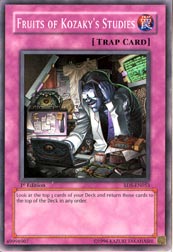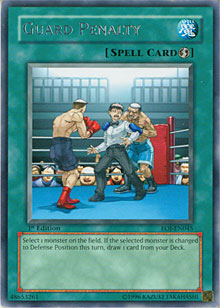How can I, a mere sociology student at Old Dominion University, use my studies to help you, the duelist? The Yu-Gi-Oh! TCG is not always about the cards alone, but also how to play the player and how to use the people around you to your advantage. To reiterate, this game is about people. I have a desire to explain this vital aspect to you in a series of columns which I call Crazy Talk.
To start, I shall provide a parable.
In the year 228 A.D., the Battle of Jieting was fought in what is now the Gansu province of China. The forces of Shu (led by Ma Su and Wang Ping) were evenly matched numerically against the opposing army of Wei (led by Zhang He and Sima Yi). Ma Su was a strategist and student of the legendary Shu prime minister, Zhuge Liang, while Sima Yi was Zhuge Liang's greatest rival and closest equal. Wang Ping and Zhang He were both excellent field generals.
Zhuge Liang advised Ma Su not to place his base of operations on top of the hills because of the inability to defend the roads and the nearby water supply. Wang Ping persisted with this advice and wanted to establish the base in a valley near water. Ma Su disagreed though, and followed the conventional strategy by placing his troops at a height advantage on the hills.
When the two forces met in battle, the small detachment Wang Ping took to guard the water was overrun by Zhang. The Shu troops were soon surrounded. Sima Yi's troops then lit the hill on fire and Wang Ping and Ma Su barely escaped, taking heavy losses in the process. The Shu forces were soundly defeated at Jieting because Ma Su didn't listen to good advice that was applicable to the situation. While attempting to hold a summit to get a good vantage point was sound in theory, there were other factors which completely changed the situation.
Advice and what one learns about anything is a very tricky thing. Something that may totally work one day may be a completely foolish idea the next. Moreover, not all similar situations are congruent, and their differences are just as important as their similarities. A person needs to filter the advice he or she gets from various sources and then tailor it to work the best in a given situation.
The Yu-Gi-Oh! duelist has several ways to find good advice on everything from building decks to dueling theory to tournament protocol. It is necessary for a duelist to take all that information and use it properly. Not all of it can be treated the same way.
1. Duelists You See In Person
These are your best sources for very quick, last-minute advice. If you're at a tournament and you're in a crunch about the last two slots in your main deck or whether you want to side more heavily against one archetype or another, asking another knowledgeable person or two onsite is a wise idea. If you need help on a deck you want to build in the future, they can give you much more accessible help than anyone else. They can also playtest with you in person, in the same conditions you would play in during a tournament. Finally, they have the ability to tailor advice in regard to your metagame based on experience, simply because you will likely be playing the same duelists.
On the minus side, unless you are at a major event (Shonen Jump Championship caliber or higher), your in-person dueling community has not only the strengths, but also the weaknesses of localized experience. The more localized and tightly knit a dueling community is, the harder it is to adapt to new ideas. For example, when my Monarch-heavy local saw a Demise player for the first time a few months back, almost everyone in the shop got utterly crushed because no one had any idea how to react: they had no face-to-face experience with the deck. Also, if a player gives you poor advice, whether intentionally or unintentionally, there are fewer stops for it in person. You might get lucky and another duelist may call the advice-giver on what he or she is saying, but a person isn't likely to have a round table discussion with hundreds or thousands of duelists about a particular subject at a local, or even at Worlds.

2. Message Boards
Many of the internet's benefits are faults as well, however. The most noticeable one is that the diverse populations of people on message boards accounts for a cornucopia of attitudes. Due to the effective anonymity of people on the Internet, online people will be far looser in how they act toward others. It's much easier to be mean to someone if there are no real consequences for your actions. Another big problem is the idea of having too many cooks in the kitchen. There are times when you simply have too many people discussing one idea, particularly when it comes to deckbuilding advice. (I can't count the number of times I've posted a deck on a message board only to be more confused than ever by the responses it received.) That's not to say you should never post a deck on a message board, but use discretion in how you utilize the information you get. That being said, if you have a longer journey ahead of you in building effective decks, you should be less discriminating in the advice you receive.
3. Article Sites
Sites like Metagame.com are chock full of experts in various fields. Some writers are accomplished players, while others are knowledgeable judges, specialists, or organizers. Regardless of the subject matter, the writers are certain to have their ideas relayed to the public in a strictly professional manner, and often, they will provide some form of contact information if readers have questions or comments on their articles. Articles (outside of event coverage) are generally created from the writer's personal perspective of what is important to discuss.
The biggest problem with articles is the lack of personal help. While you may read about why a certain card is good or why one deck beats another, it's unlikely to help you decide what you want to put in as cards 39 and 40 for the deck you're bringing to your local tomorrow. Articles are great to use as foundations for deckbuilding, but not for creating a finished product. Reading about how a particular deck wins or how it's run will help you down a path, but only you can really tailor the deck to your own play style. Thoughtlessly using the information from an articleÑwhether it's deck construction advice, play choices, or anything elseÑwithout taking time to think about how the information will realistically apply to you will never help you at all. Articles are written as something that everyone can relate to, and it is up to you to take or leave them in a way applicable and useable to you.
4. Certified Volunteers
 Upper Deck Entertainment-certified judges, specialists, and tournament organizers are not only present to run events, but to help you as well. They are the definitive sources for official rulings and information about the game. Their experience lies particularly in dealing with the public and making sure everything is running smoothly. A good portion of certified officials are accomplished players in their own right and can give advice from a player standpoint, as well as from the standpoint of an official.
Upper Deck Entertainment-certified judges, specialists, and tournament organizers are not only present to run events, but to help you as well. They are the definitive sources for official rulings and information about the game. Their experience lies particularly in dealing with the public and making sure everything is running smoothly. A good portion of certified officials are accomplished players in their own right and can give advice from a player standpoint, as well as from the standpoint of an official.
Along those same lines, while some officials are accomplished players, not all of them are. Don't automatically assume that because someone's a judge that he or she can give you splendid advice on card choices. Also, an official will likely strive to be as diplomatic as possible when talking to you and may not be as blunt as necessary when it comes to advice. (For example, the judge of your local isn't likely to tell you to your face that the pile of 90 random cards you call a "deck" really should go in the trashcan.)
These are not your only sources of information on how to successfully build a deck and duel, but they should be your main ones. Moreover, when using these sources, you should learn how to take the information and mold it in such a way that it will be useful to you. Many problems I see involve players with large amounts of good information and advice at their disposal, but who don't use them properly. Much of the process is learning through experience, but part of it also involves recognizing your own situation before anything else. You must understand yourself and what's around you.
Ma Su didn't, and look what happened to him.
-Christopher Contreras